The Big Interview: Yves Guillemot
The Ubisoft CEO discusses Vivendi's takeover plans, conquering China, and taking risks with Beyond Good and Evil 2
"When you fight something you know has a risk of destroying your company, you have lots of energy because you know that everything you've created with your teams will stay alive."
Yves Guillemot has probably been questioned about the potential threat presented by a Vivendi takeover in almost every interview of the past two years, but his stance is resolute. Shortly after the French media behemoth first showed interest in Ubisoft, the CEO assured his staff he would "fight to preserve our independence". Speaking to GamesIndustry.biz last week, it's clear that fighting spirit is stronger than ever.
Vivendi is an intimidating foe. Once the parent of Activision Blizzard, the firm holds 27% of Ubisoft's share capital as of last month - with French law dictating that it must make an offer to buy the company once its stake reaches 30%. Reports back in April claimed Vivendi is determined to take over the publisher this year.
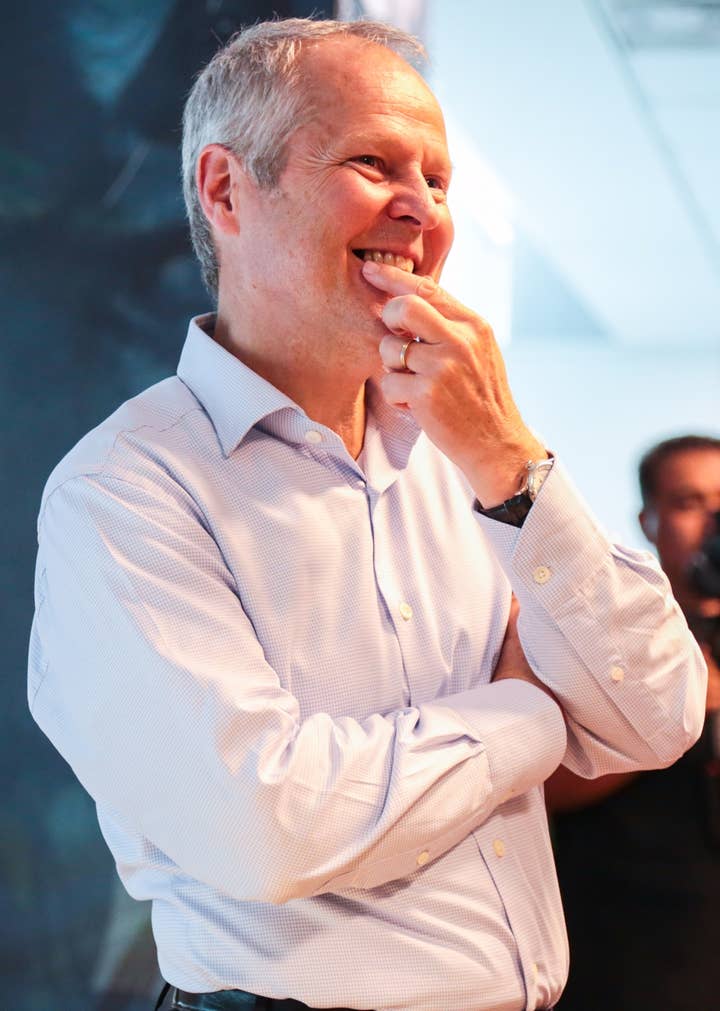
Yves and the rest of the Guillemot family are doing what they can to fend off its would-be conquerer, continuing to acquire shares and preventing Vivendi from increasing its hold on the company. At last count, the Guillemots held 13.6% of Ubisoft's shares - far less than Vivendi's stake. As valiant as Yves' fight is, does it not feel like a losing battle?
"No, I don't think so," he says. "Staying alive means agility, creativity and the possibility to work in an environment with people that are happy to be there and can give as much as they can to create something that will please the market. Those values are very important to fight for, so it's not only me, it's the whole company, fighting to keep its values.
"That's why we have more of a chance, because it's not one guy saying 'I want to stay as the boss', it's the company itself saying 'this is our work, so we'll do whatever we can to make sure it stays that way'."
"It's not one guy saying 'I want to stay as the boss', it's the company itself saying 'this is our work, so we'll do whatever we can to make sure it stays that way'"
For the Guillemots, defending Ubisoft against Vivendi is already quite a personal affair. The French media empire has already taken over another of the family's businesses: leading mobile publisher Gameloft. You would expect Yves to keep a close eye on Gameloft, as changes made under Vivendi ownership might foreshadow what would happen to his own company, but the CEO insists the two firms are actually incomparable.
"[Ubisoft and Gameloft] have different philosophies," he explained. "It's not easy to compare the two because mobile companies and AAA companies are very different. The creativity needed to make Ubisoft succeed is as important as it is at Gameloft, but we're a lot more dependent on it than them. 80% of the turnover done by Gameloft is recurring. A huge amount of the turnover we do every year has to come from innovation and new products."
While creativity may be at the core of Ubisoft and Gameloft's strategy, there's little sense that such motivations lie behind Vivendi's takeover bid. The entire industry is watching to see how this battle plays out, with Yves adding he's very grateful for the support he's received - not only from other companies, but from the 12,000-plus employees who would be directly affected by such a change in management.
"We live in a dangerous world," he says. "There are challenges, and the best will remain. We are under attack, we are trying to fight against it. We think we are ready to fight against those problems."
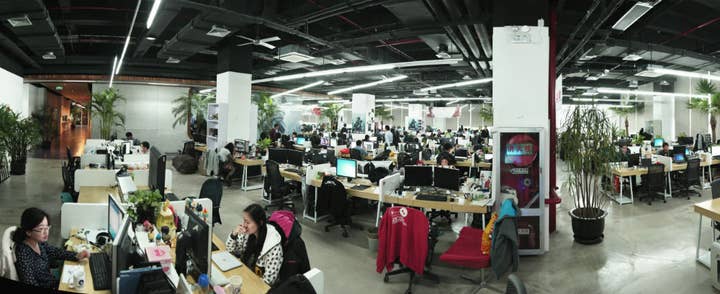
Until Vivendi makes its next move, it's business as usual. Our time with Guillemot is spent as he is taxied between the Shanghai New International Expo Centre and a dinner meeting in the city centre, having already spent much of the day meeting potential new partners from the Chinese games industry.
Earlier that morning, the chief exec had been browsing the Ubisoft booth at China Joy, the nation's largest games convention. The idea of a CEO on the show floor might perplex some companies, particularly outside the games industry, but Guillemot believes it's an important part of his job to present consumers a face by which to recognise the firm.
"I learn more about our company when I go to see the fans than when I'm at my desk"
"I learn more about our company when I go to see the fans than when I'm at my desk," he explains. "It's very important for me, as well as the people that work in the company, to get feedback from them. What we do right, what we do wrong, what we should improve and how we should improve it. It's always very valuable - because when they don't like us, they say so."
They certainly do. Ubisoft has been subject to plenty of criticism over the past few years, whether it's from the skinless face glitch of Assassin's Creed Unity, the swear-heavy sequel to the family-friendly Beyond Good & Evil, accusations of racism spawned by Far Cry 4's cover art, a developer's comments that playable female characters are too hard to animate, or disappointment over leaked details for the Mario + Rabbids games (although the full reveal has since been met with widespread praise).
Each instance prompted an outcry in the echo chamber of social media, and while this might seem detrimental to Ubisoft's reputation, Guillemot is determined to draw positives from every incident.
"Actually, we learn a lot," he says. "It tells us what can go wrong, and it makes us recheck those things if we have a chance to improve them before launch. Some of the feedback is criticism, but it is sometimes very valuable. We take that very seriously. When you create a game or do something to be more efficient, you have to make sure you don't listen to too many people. But at one point, you have to go back and listen, and in some cases it's like a reality check."
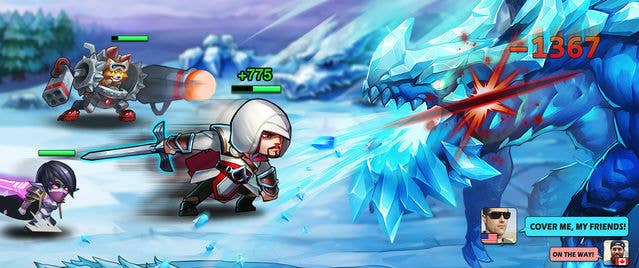
Excited fans approach Guillemot at China Joy, posing for photos and offering yet more feedback on the publisher's games (no doubt with less vitriol than the anonymity of Twitter allows). That Chinese teenagers even know who Yves is a testament to how well-established Ubisoft has become in the nation's seemingly impenetrable market.
"We are under attack, we are trying to fight against it. We think we are ready to fight against those problems"
The publisher has officially launched 50 titles in China over the last 20 years, each one surviving the country's rigourous approval process where only games deemed fit for release by the General Administration for Press and Publication are allowed to be sold to Chinese consumers. The GAPP's criteria are extensive, but games with any obscenity or violence are particularly hard to pass. As a result the Assassin's Creed, Watch Dogs and Far Cry franchises have yet to see an official release in China.
Instead, Ubisoft's popularity in the region stems largely from its PC output, including the Heroes of Might & Magic series which, while niche in the West, is a "significantly meaningful brand" in China, according to the publisher. In fact, China is the top sales region for HOM&M VII.
Mobile is also a major feather in Ubisoft's Asian cap, with China accounting for 11m monthly active users and a 16% share of the publisher's mobile audience. Oddities like Hungry Shark have 120m unique users in the country, prompting the firm to ramp up its mobile efforts in the region. In addition to portable Might & Magic titles and China-first games like Assassin's Creed: Blood Sail, Ubisoft has teamed up with local firms like Lilith Games, which has added the Prince of Persia, Rayman and Assassin's Creed favourite Ezio Auditore to its mobile hit Soul Hunters.
Given that Assassin's Creed has yet to receive an official release in China, this might seem an odd partnership, but Guillemot reveals that the series has much higher awareness than you might think.
Speaking to a group of journalists earlier during the trip, he said: "On mobile, [Assassin's Creed] has been approved a few times, so it exists on mobile. On PC and console, because of grey imports and Steam there are still lots of people playing Assassin's Creed here in China - it's the sixth biggest market for us. So the brands are known, but they're just not as mass market as other games we publish in China."
Piracy also helps boost the brand. Assassin's Creed IV: Black Flag has more than 5m players in China, and most accessed the game illegally. In the taxi at the end of the trip, we ask Guillemot whether this puts Ubisoft in an awkward position: increasing its brand awareness and growing its audience, but primarily through the grey market and piracy.
"We would react [if Steam was blocked] and find another way. Once your brand exists in a country, you always find a way"
"Steam is selling in China, and everyone knows it," he tells us. "It's something that is allowed by the authorities. That's why we are selling games here. But in a way, it gives the market a chance to breathe, letting certain products from the West come to China."
Rumours persist, however, that the Chinese government may cut off Steam's access at any moment - reportedly under pressure from domestic games giant Tencent and its approved WeGame platform. Even without this competitive threat, there's nothing to stop the government blocking Steam anyway, but Guillemot remains unconcerned.
"We have been going through lots of challenges in many countries," he says. "We would react and find another way. Once your brand exists in a country, you always find a way."
With Xbox One and PS4 now available to Chinese consumers, Guillemot hopes to work with local partners to get approval for console titles so Ubisoft's brands can can grow further legitimately - no doubt the subject of many of his meetings this day.
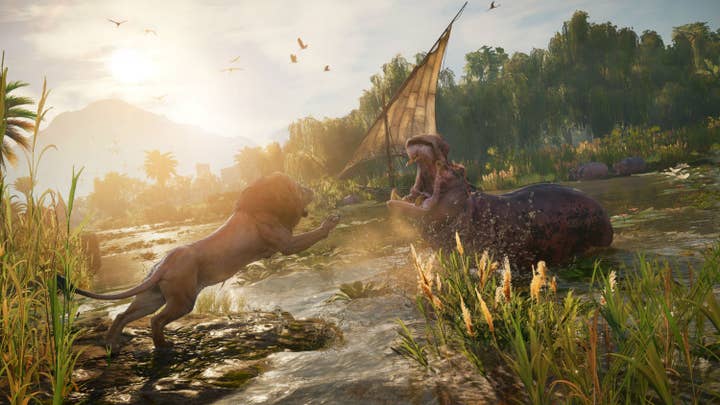
Ubisoft has a much stronger presence in China than just as a publisher of games. It also has native development talent - in fact, that's part of the reason we're in Shanghai in the first place.
China Joy marks the final day of a press tour designed to highlight the publisher's operations in China and Southeast Asia. Already we have visited Ubisoft Singapore, home to the development team behind new pirate IP Skull & Bones, where we also met studio heads from the firm's development teams in the Philippines and Chinese city Chengdu.
Ubisoft Singapore and Chengdu were established in 2008, with the Philippines' outlet opening last year, but it's the Shanghai studio that's the real star in these parts. Founded in 1996, the studio predates the games operations of Tencent, Netease and Perfect World, and has firmly established Ubisoft as part of the local industry.
"Our arrival 20 years ago to a business that was not very developed in China at the time changed the universe here"
"The fact that we arrived 20 years ago to a business that was not very developed in China at the time changed the universe here," Guillemot tells us. "We see many of the ex-Ubisoft employees found successful companies in this country. The team at Shanghai are in touch [with those ex-employees] on Facebook, so they're still part of Ubisoft in a way, because that's where they learned to make video games and they say they have good memories of that time. In a way, it's making Ubisoft part of the community."
During our visit to these studios, we learn more about their individual contributions to Ubisoft's blockbusters. It's well-known that Singapore created the water tech and naval combat that debuted in Assassin's Creed III, but other teams' accomplishments often go unsung. Ubisoft Shanghai, for example, handles much of the Just Dance motion-capture maps as well as the wildlife that appears in everything from Assassin's Creed Origins to Far Cry 5. It's also responsible for the acclaimed Far Cry 3: Blood Dragon expansion, as well as other DLC. Ubisoft Chengdu often handles world-building for Assassin's Creed and forms the second team behind Skulls & Bones, as well as handling Ubisoft's casual mobile titles.
"Many of our studios really want to show that they can [take on] the world"
These are welcome revelations given that Ubisoft's PR usually states little more than how many studios are working on each AAA title, and the lengthy credits sequences rarely offer any insight. Is this trip the start of Ubisoft raising awareness for each team's talents?
"Maybe we should highlight it better, yes," Guillemot admits. "We don't communicate it too much because we don't want to complicate the message, but it's true that it could be important for people to understand that it's a group of teams that are trying to put the best they can in those games, and that's what makes them rich [in quality]."
Out of the local studio landscape, all eyes are on Ubisoft Singapore as it forges ahead with the publisher's newest IP. Skull & Bones stems from tech that was built for Assassin's Creed but later evolved into a standalone product - a similar story can be seen with Ubisoft Annecy and Steep. Guillemot is keen to see each of his studios grow to the point where they can lead their own projects.
"Each project is something they learn from and then they'll be able to create something that will change the industry," he says. "It's happened in many of our studios. Romania was able to do Silent Hunter, Malmo did The Division, Sophia did Assassin's Creed: Rogue. If you look at many of our studios, they really want at some point to show that they can [take on] the world. That doesn't mean they don't like continuing projects with other teams afterwards, but it gives them a way to express internally and externally that they have the creativity to be among the best in the world."
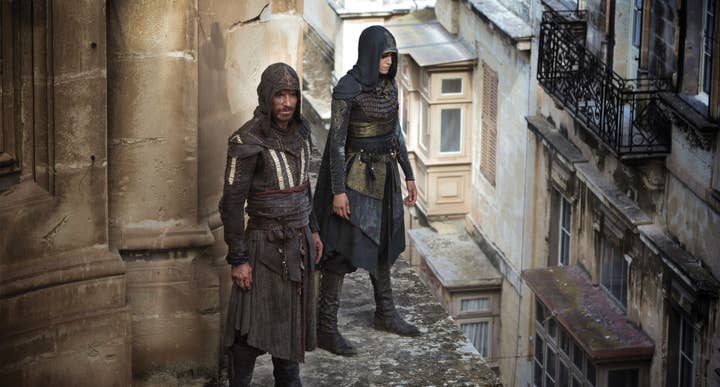
New IP is always important to any publisher, but Assassin's Creed is the big ticket at Ubisoft. Montreal has led the franchise since its inception, although Quebec had its chance at the helm with Syndicate while Sophia handled spin-off Rogue. But how does a studio earn the right to contribute to the direction of Ubisoft's flagship series?
"It's not me deciding, actually," says Guillemot. "It's the studios themselves and a group in Paris assessing whether or not they can do it. The studio don't want to take the lead before they feel ready, because they know if they don't succeed they won't see it again. It's a process where everyone wants to be at the right level to take their projects further."
"There's one thing we didn't look at: exactly how many players were interested at the time by female characters, science fiction world, and so on"
Opinion has been divided on Assassin's Creed and its advancement for a few years now, ramping up the pressure for the reinvention that Origins is aspiring to be - but the future of the brand lies beyond the upcoming title. Earlier this year, the series made its cinematic debut in a movie fronted by Michael Fassbender, Marion Cotillard and Jeremy Irons. Hopes were high that Assassin's Creed would finally break the sequence of poor film adaptations for leading games franchises, but it released to unfavourable reviews and much disappointment from the fans.
Nevertheless, this has failed to stifle Guillemot's wider entertainment ambitions for Ubisoft and its brands.
"It's a process, and each step is teaching you to do better," he says. "In the case of the Assassin's Creed movie, we learned that it's very important to work even more on the script. We also saw that it's very important to anticipate more how things will be done. You have to know precisely what you want to obtain in terms of quality so that you can define it yourself. But it's by iteration that we'll be able to improve step-by-step all of those types of entertainment pieces we create."
"It's a risk, but we feel that there are lots of people who want toys-to-life. Maybe they don't want to say it, but they do want to buy it"
We're running out of time with Yves, so we invite him to reflect on this year's E3 showing, undeniably one of the best in the publisher's history. Amidst the meme-spawning image of Guillemot and Shigeru Miyamoto wielding cartoonish weaponry and the annual wacky dance number, there were a number of surprising announcements.
Perhaps the riskiest was Starlink: Battle for Atlas, a new toys-to-life brand that debuts at a time when the sector is believed to be dying, if not dead. Skylanders and Disney Infinity have already bowed out, so why on earth would Ubisoft enter a struggling market?
"We thought that bringing 2.0 of that model was potentially very interesting," says Guillemot. "We'll see. It's a risk, but we feel that there are lots of people who want this type of game. Maybe they don't want to say it, but they do want to buy it."
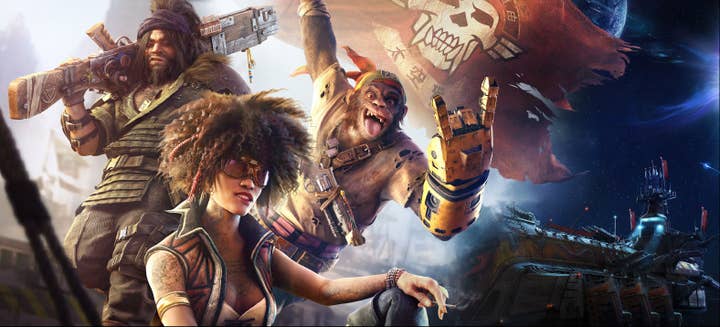
Arguably just as much a risk is the reveal that cemented Ubisoft as the most impressive showing at E3 2017: Beyond Good & Evil 2. Teased for years and craved by fans for over a decade, the hype would have you believe the title is a guaranteed best-seller. However, the original was not a commercial success, and Electronic Arts has just suffered a similar disappointment with its revived Mirror's Edge. Our final question: is putting faith in this sequel too great a risk in this hit-driven world?
"People loved Beyond Good & Evil. It was a big surprise because normally market analysis would have told you not to do it"
"I don't think there's a risk there," Guillemot tells us. "Well, there's always a risk when we create games, but I don't think there's as much risk because Michel [Ancel, director] has been through so many projects. The first Beyond Good & Evil was very good, Michel did what he wanted and what we thought would be the best for the players. But there's one thing we didn't look at: exactly how many players were interested at the time by female characters, science fiction world, and so on.
"It seems bizarre to say, but at the time we had lots of men playing games and they wanted specific types of games. All the women that saw Beyond Good & Evil loved it, and it was a huge surprise. And lots of people wanted something different, and they loved it. It was a big surprise because normally market analysis would have told you not to do it. It didn't sell as many [copies] because it didn't respond to the majority, but the minority loved it so much it created something different.
"Now, because we've been doing more games, Michel will continue to take risk - as you could see - but he has more information and is automatically responding a lot more to the majority of the players.
"And the market has evolved. It's a lot more open than it was at the time. I remember when we launched Beyond Good & Evil, we had lots of critics in magazines, on forums and so on that were very tough on us. But for us it wasn't a problem because we were so proud of that game. At the end of the day we were very happy because it helped the company bring Peter Jackson on board for King Kong, it helped to change the company image and to recruit lots of talent. There are plenty of other elements that helped the company too. So it's not about the short-term profitability, you also have to look at what in general a creation will bring to the company."
Full disclosure: This interview was conducted during a Ubisoft press trip. Ubisoft paid for our flights and accommodation.








